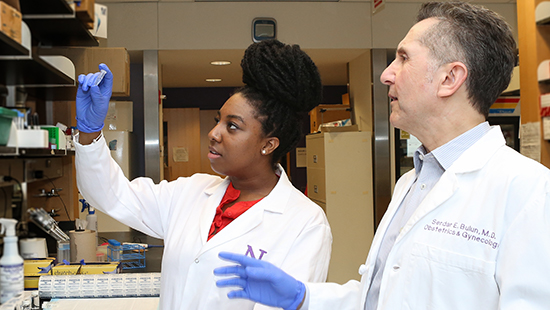Regenerative Engineering Training Program (RE-Training)
The Regenerative Engineering Training Program, offered to students currently enrolled in the Biomedical Engineering PhD program or the Medical Scientist Training Program (MSTP), and who have completed the first year of the PhD program at Northwestern, is a convergence research predoctoral training program funded by the National Institutes of Biomedical Imaging and Bioengineering through grant T32-EB031527.
The mission of the RE-Training Program is to offer an integrative curriculum and environment to prepare the next generation of researchers that are competent at converging advances in materials science, life sciences, and translational medicine to generate practical regenerative engineering solutions that can be applied to challenges in the reconstruction or regeneration of tissues and organs.
This two-year program is designed to educate the next generation of regenerative engineers using a three-member mentor team and relevant exposure to both clinical and industrial experiences through our partners. The mentor team must include a practicing surgeon or physician, a life sciences expert, and an engineer. The team-based approach for training pre-doctoral students that includes academic, clinical, and industrial mentoring experiences makes our program unique among all T32s.
Vascular Surgery Scientist Training Program
The Vascular Surgery Scientist Training Program at Northwestern University, which is funded by a T32 grant from the NIH, is a two-year mentored research training experience for general and vascular surgery residents (MD/DO) interested in research-oriented academic careers.
The T32 funding mechanism provides a stipend, tuition, fees for coursework, travel funds and health insurance.
Our goal is to provide trainees with the scientific environment, didactic training, career development mentorship, and opportunities for collaboration required to jump start careers as surgeon-scientists.
Individualized training plans are developed by the mentor and trainee. Trainees can choose mentors and secondary mentors from many different clinical specialties and research fields and select one of several tracks of study or a combination of tracks:
- Vascular biology with a basic science emphasis
- Clinical research including outcomes studies
- Biomedical research in partnership with the Department of Biomedical Engineering
- An integrated program designed by the trainee and his/her mentors
Medical Scientist Training Program (MSTP)
Our dual-degree MD-PhD program integrates two parallel pursuits: training students to excel in biomedical research and instilling the values, knowledge, and art of clinical medicine. We offer a challenging, individualized program where students interact with extraordinary faculty, peers, and patients, all against the backdrop of a vibrant and diverse city.
Biomedical Engineering (BME)
The biomedical engineering community at Northwestern University includes faculty appointed in 12 departments within engineering, medicine, arts and sciences, and communication.
The breadth of faculty members’ research interests affords students a wide variety of research opportunities. Research takes place on the main campus in Evanston, on the medical school campus in downtown Chicago, and at the Shirley Ryan AbilityLab.
We offer the following graduate degrees through Northwestern University’s Graduate School:
Master of Science (MS) in Biomedical Engineering
Doctor of Philosophy (PhD) in Biomedical Engineering
***
Driskill Graduate Program in Life Sciences (DGP)
he Walter S. and Lucienne Driskill Graduate Program in Life Sciences is a comprehensive, interdisciplinary PhD program that trains students in biomedical sciences while giving them the flexibility to pursue a variety of research interests and dual degrees.

Faculty work with students to conduct research across disciplines, including biochemistry, biology, genetics, immunology, microbiology, neurobiology, pharmacology and computational biology.